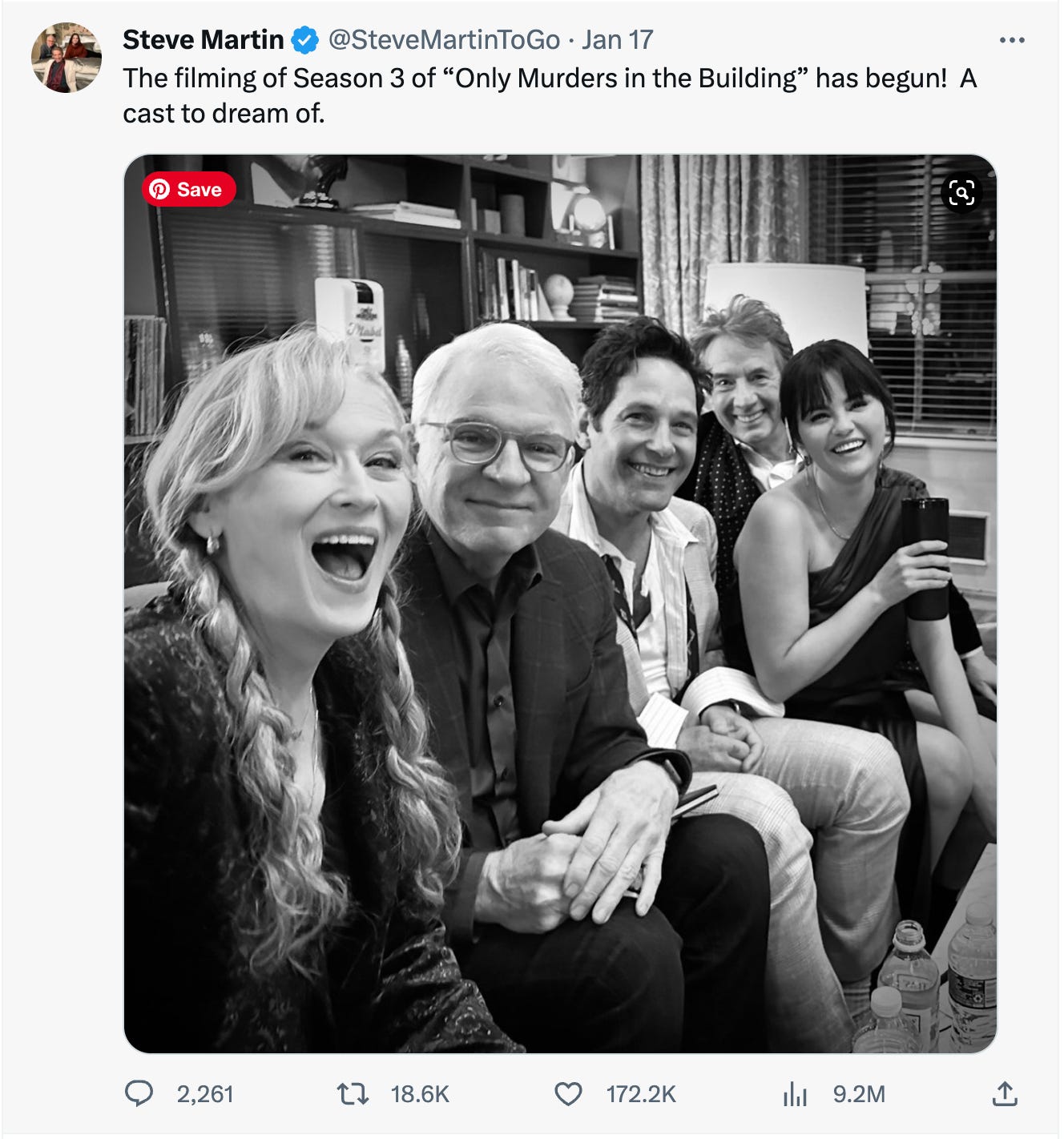Your followers might hate you
Everybody knows the problem with the feedback system of Twitter/X—likes and responses and reposts (previously retweets) encourage mobbing, clickbait, and other bad behaviour. Jonathan Haidt talks about this in a recent Atlantic article.
One of the engineers at Twitter who had worked on the “Retweet” button later revealed that he regretted his contribution because it had made Twitter a nastier place. As he watched Twitter mobs forming through the use of the new tool, he thought to himself, “We might have just handed a 4-year-old a loaded weapon.”
I agree with a lot of what Jon writes here, but I want to talk about a less serious problem. This only affects a small group of people—mostly academics who tweet a lot, and even here it only applies to a minority. (Some of my Substack posts will be on important matters; this is not one of them.). But, who knows, maybe you’re the person I’m talking about and then this will be useful, maybe life-changing!
For three sorts of people, this feedback system provides accurate information.
Those who say nice things
I’m thinking of popular tweeters, like Steve Martin (4.5 million followers), who write tweets that make people laugh or go awwwwww. But I’m also thinking of the small fry who use Twitter to congratulate students and colleagues on accomplishments or provide information and opinions on low-controversy topics, like, I don’t know, pretty sunsets they’ve seen or actors that are obscure but really do a great job. These people can count up likes, retweets, and responses and use this as a rough measure not just of how many people engaged with their post, but also of how many people liked it, in the original sense of “liked”—having positive feelings about it. The two measures (engagement and liking) are pretty much the same. ACCURATE.
Controversialists (edgelords, shitposters, etc.)
Take Jordan Peterson, who has about the same number of followers as Steve Martin. A lot of his posts are controversial, he knows it, and he intends it. He can calculate engagement with his tweets just as Steve Martin does, by counting likes, reposts, and so on. But he also gets a sense of how many people think his tweets are stupid, cruel, and ignorant because they will tell him. They will reply to him with nasty remarks; they will repost his tweets with derisive and mocking comments. If he wanted to tweak the offensiveness of future tweets, he has plenty of information as to which sorts of topics and what style of presentation has this effect. ACCURATE.
The Accidentally Famous
There are cases where some otherwise normal user of Twitter goes viral, such as the father who posted a lengthy thread of how he refused to open a can of baked beans for his daughter, insisting that she figure out how to use a can opener by herself.
When the reaction is negative, as it was for “Bean Dad”, the poster will learn this by being deluged with hateful comments, getting death threats, losing their job, and so on. ACCURATE.
When, less frequently, a post goes viral in a good way, the poster will learn this by getting praise, job offers, and, in one case, having their tweets turned into a television series. ACCURATE
Now consider two other cases:
Quick preliminaries: First, I’ll focus on academics because these are the cases I know best; for all I know, the same thing occurs in other communities. Second, don’t worry, despite what I hinted above, I’m not talking about you. Jon Ronson, author of The Psychopath Test, talks about how people go up to him, as an expert on psychopathy, and say that they worry that they are psychopaths. His response is: If you worry about being a psychopath, you’re not one. The same logic applies here.
Nasty people in a small world
A while ago, a professor on Twitter posted a series of nasty remarks about someone that I like, mostly attacking their work but making it personal in an ugly way. I was pissed, and I wasn’t the only one. The professor’s name would come up in conversation with other people in our relatively small community and the general consensus was that they (I was once a skeptic about singular “they” but I’ve become a convert, and in cases like this, it’s perfect) were being an asshole. This surely had professional consequences for the professor. Maybe it shouldn’t be this way, but people take these things into account when deciding who to collaborate with, who to invite to give a colloquium, and who to offer a job to.
The thing is, if you looked at the responses to the professor’s posts, they were overwhelmingly positive. Lots of likes and reposts and cheering on.
Why didn’t people respond negatively? Why didn’t we speak our minds? There are two factors:
In this small community, most people post under their own names.
And so there are risks to calling this person out. In some cases, it’s because they are perceived as powerful and in a position to retaliate; they might be at a university you hope to work at one day or an editor for a journal you might want to send a paper to. Or, paradoxically, it could be because the poster is perceived as lacking power, and so criticizing them would be seen as “punching down”. Or the attacks could be of a certain sort—if someone is accused of being racist or sexist, say, defending them might make people think you yourself are racist or sexist, or at least don’t take racism or sexism seriously enough.
(Should professors be braver? Probably, but that’s a post for another day.)
I’ve seen this happen, to varying degrees, three times in the last several years. In each case, the feedback system of Twitter meant that—unless some friends told them about the consequences of their actions—the poster likely didn’t know that people were pissed. Actually, they might have thought the opposite, that they were viewed as heroes. NOT ACCURATE
Boasters, self-promoters, etc.
There is nothing wrong about broadcasting your good fortune—your new job, your prestigious award, your fantastic new publication, the fact that your new book is on the New York Times bestseller list. I’m not a cynic about human nature; we can hear good news about someone, particularly someone we like, and feel warm fuzzies. We can be genuinely happy for them. (Well, except for the bestseller list. That’s too much for the rest of us who write books that don’t do as well; keep that shit to yourself.)
But some people are known to overdo it, to broadcast every accomplishment, often in an oily humblebrag way, and it gets to be a bit much. Adam Smith, in his masterpiece The Theory of Moral Sentiments, published in 1759, notes that someone who gets lucky in life
may be assured that the congratulations of his best friends are not all of them perfectly sincere. … envy commonly prevents [them] from heartily sympathizing with his joy.
And then gives advice:
If he has any judgment, he is sensible of this, and instead of appearing to be elated with his good fortune, he endeavours, as much as he can, to smother his joy, and keep down that elevation of mind with which his new circumstances naturally inspire him.
If you can’t resist spreading the news about your successes, don’t make such a big deal about how happy you are.
Going back to social media, you probably see where this is going: Such a person might be mocked and derided in the real world, but all they’ll see on social media are likes and retweets?
I hate to single anyone out here so take …. me. I recently posted about a professional accomplishment and got a positive response, lots of likes, a warm “congrats, bud”, a few people saying “well-deserved”. It felt nice. And then it occurred to me that no rational person is going to respond with “Who cares about your little prize?” or “Not well-deserved at all, Bloom!”—but they might think this way and talk about it with others. How would I know? NOT ACCURATE
Last point: Everyone talks about how unnatural social media is, how it differs from normal face-to-face interaction. But in this regard, Twitter is just like real life. The person who endlessly shit-talks other people or boasts about their own good fortune is going to pay a social cost—even if they might never be aware of it.






Brian Earp (mentioned here by Jesse Signal: https://jessesingal.substack.com/p/toward-a-grand-unified-theory-of) mentions how social media is missing the "passive negative feedback" of real life: "Imagine I’m sitting in a room of 30 people and I make a dramatic statement about how outraged I am about X. And, say, five people cheer in response (analogous to liking or retweeting). But suppose the other 25 people kind of stare at the table, or give me a weird look or roll their eyes, or in some other way (relatively) passively express that they think I’m kind of overdoing it".
Very intelligent post, Paul. This is a phenomenon I've long been preoccupied with. The way I think about it: in real life, it is much more difficult to get people to directly verbalize negative opinion, even constructive negative opinion, to your face except they're your sworn enemy. If you're generally a decent, kind, good-natured person, it even becomes less likely you'd ever get to hear about your serious shortcomings from your social circle. One then sort of live in a bubble of goodwill. One way I have devised to burst this bubble is by personally handpicking some intelligent friends, with critical minds (that are usually never exercised in my direction) and specifically instruct them to give me a critical feedback (not interested in the positives because I know I'd get plenty of that by default, true or exaggerated) on a particular performance I'm about to give. Each time, I'm surprised at the depth and sharpness of their critique which would never have been revealed were they not expressly commissioned to offer it. And this is totally understandable.